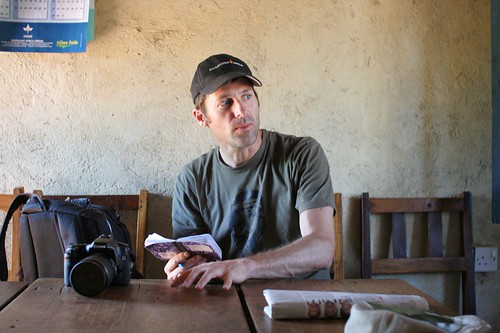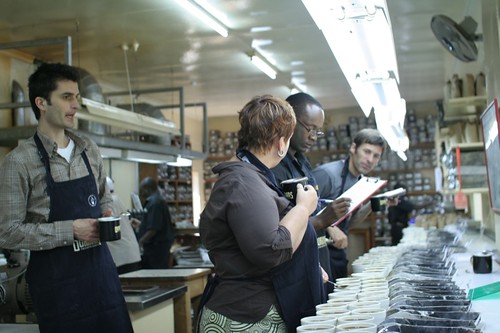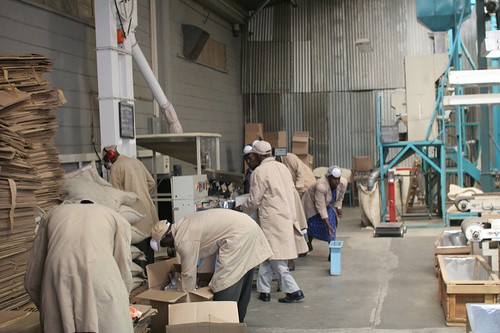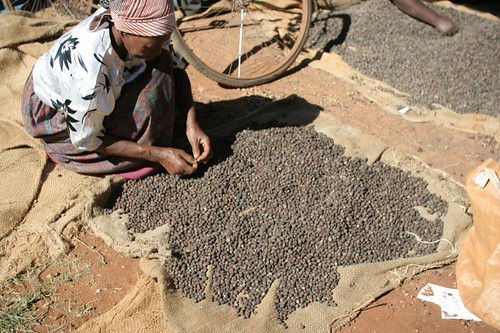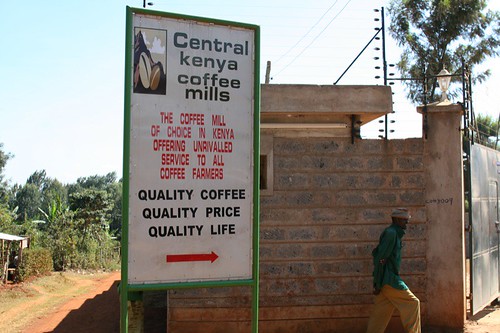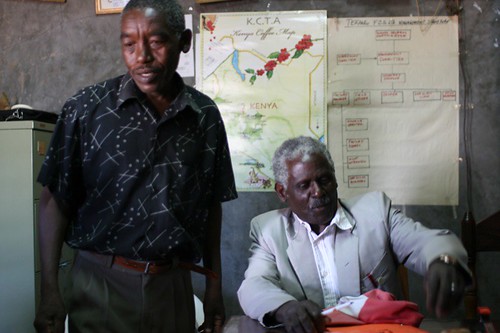A week has passed and finally I have time to write on the blog again after some wild time on the countryside in Kenya.
It has been a fantastic week where I have cup tasted about 200 to 300 different coffees, if not more. Some terrible, but many of the coffees I have tasted have been fantastic.
I have been traveling with Thompson Owens (picture) from Sweet Marias and Peter Dupont (second picture) from The Coffee Collective during most of the week. We have had many great discussions and talks which have been very educational and inspiring for me.
I promised you a report, so here it is:
Monday was spent at Dormans head office tasting countless cups of various coffees with various qualities. I did not really find anything spectacular, as the samples were all control samples of the coffees that were going to be auctioned on the Tuesday at the Nairobi Coffee Exchange. The coffees on the table were selected because Dormans was unsure of its quality after cupping the lots the previous week.
Either way, the cupping session was really good in order to calibrate my palate for the next days of cupping.
In the afternoon we visited Coffee Management Services (CMS) in Ruiru. We met with Mr. Kamau. CMS is a company educating their clients in good agricultural practices. Their clients are mainly smallholder farmers which are members of Cooperatives. CMS also work as a marketing agent for the coops, which means looking for potential buyers for the farmer’s coffee.
I am not going to explain in detail all that CMS does in this post, but basically CMS will help us to set up a direct trade model with a coop in Kenya and provide us with the documents and transparency so that we are sure that the farmers are getting payed their money. This is especially important as we try to buy the highest quality coffees for a premium price.
We heard about some cases in Kenya where farmers have not got their money yet after the 2007/2008 sales. I can’t even express how disrespectful and harmful that is to the farmers and the coffee trade!
CMS however guarantees the money will go to the coop within 14 days after the sale has taken place, and after talking with a lot of coops and farmers, they often get payed before the standard 14 days.
In the afternoon we went to the New Gatukuyu Coop Society where we had a very nice meeting with the chairman of the coop and his fellow farmers. Meeting farmers eye to eye is very rewarding and we had some great conversations with them about how to improve the quality of the lives of the farmers as well as the quality of the coffee they produce.
Tuesday featured some more cupping at Dormans and also a visit to their factory where we could see how they will coloursort, handsort and vacuum pack our coffees, once we have bought them.
In the afternoon we visited the Gikanda Farmers Coop. Society and the Ndaroini and Gichathaini factories (wet mills) where they have processed some of the best Kenyan coffees this year. Their coffee always stood out on the different cupping tables during the week. Although all the good coffee has already been processed, we managed to get a glimpse of some sorting and weighing of Mbuni coffee (picture below), which is terrible tasting natural processed coffee made out of the leftovers from the harvest.
On Wednesday we visited the huge Central Kenya Coffee Mill in Nyeri where the parchment is removed from the beans, beans are graded, sorted, and cleaned from any foreign matter before they are packed in burlap for storing before the weekly auction in Nairobi or packed in containers for shipping. We also cupped a lot of great coffees from Kiawamururu, Gichathaini, Ndaroini, Kangocho, etc. In the afternoon we visited Kiawamururu which was a great factory. No wonder they produce great coffees!
At the end of the day we had a meeting with the Karagoto coop society, where they have produced the best Kenyan coffee I tasted on this trip. The coffee is produced at the Tegu factory / wet mill which is part of this society, and I will for sure blog more about this coffee on a later stage as I have already bought 19 bags of it.
Thursday and Friday were spent cupping all the best coffees we had found on the trip and a visit to the Kiariaini factory, which was a bit dissapointing compared to all the great factories we had already been to. Therefore it was good to get back to Nairobi for some serious sun bathing by the pool.
Next stop for me is Ethiopia for a week of sightseing of probably the greatest coffee producing country in the world..
See the slideshow below for more pictures from Kenya.
[tylr-slidr userID=”30608893@N03″ groupID=””]http://www.flickr.com/photos/timwendelboe/sets/72157614449573685/[/tylr-slidr]

